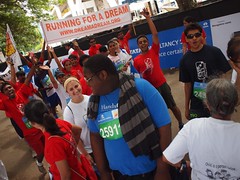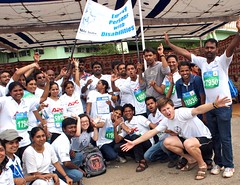By Erika Takeo
Yesterday we went to the World Bangalore 10K race sponsored by Tata Consultancy Services. This is a large event where NGOs can raise funds for their causes by participating in the race. Moreover, businesses can “run for a cause” and raise funds for a specific NGO.
Both EnAble India (where Sam and I are interning) and Dream A Dream (where Sarah and Kipaya are interning) participated in the event. Unfortunately I did not get to walk with the EnAble India team (I missed registration) but I did get to watch all of the different teams cross the finish line holding their banners about their various NGOs and causes. The energy of the various NGOs was exciting and I especially liked the special cheers that many organizations were saying as they crossed the finish line. I thought the event was quite fun, with dance music and food for participants at the big stadium finish.

More great photos from the event here
Of course, I am one to always find something ironic in an event like this. Part of this event is a way to raise funds for NGOs who are working on very important social causes such as the employment of disabled adults and building life skills in underprivileged children. The organization of the event, however, did not always match what I would think the values would be of these NGOs.
Let’s use the example of bottled water, which was passed out to all participants at this event. Bottled water is often stolen (I use this word to show my opinion of the extraction process) from local villages to be bottled and sold for huge profits. The bottles are made with PET plastic that has a number of carcinogens that especially affect those who live near the production facilities, usually in low income areas. At the Bangalore 10k, once the water was consumed, bottles were mostly tossed on the ground. There were some trash bins (no recycling or composting) but they were rarely used. Even if bottled water were to be recycled, it is unlikely that it would be made into another product that would be recyclable (this is called “downcycling”). Thus, bottled water almost always has negative social and environmental connotations. Would many of the people at the 10K (who I presume are somewhat socially/environmentally conscious) be okay with this if this were indeed the case?
A big sponsor of the event, from what I could tell by their advertising everywhere, was Nike. (Portland’s presence is even here in Bangalore.) While Nike has done many things in the past few years to improve its image, I still do not believe that all of their practices are socially, economically, and environmentally just. How much were their workers paid in Indonesia to make my favorite pair of red running shorts? Do their factories use environmentally sound practices? I’m not so sure. Some NGOs probably ordered their 10k themed shirts from Nike and they were made in some sort of “sweatshop” in India itself. Perhaps even a young child made them. Yet so many of the people at this very event are working to eradicate exactly these practices—so how could they be okay with having Nike there saying how awesome of a company it is?
To me, the bottled water and Nike aspects of the event (and these are just a two examples) are not aligned with the values underlying conscious consumption. Nor are these aspects aligned with what the NGOs at this event represent. That is not to discredit this event in any way since I think it is a good way for NGOs to network and fundraise and promote their work. It is also a great event for laypeople to get involved in a cause. I think it just goes to show that you sometimes have to be stuck within the system in order to “fight” it. I am definitely in the system even though I am trying to change the system. It’s extremely difficult to create a “pure,” “wholesome,” event to support social enterprise. Perhaps the fact that the bottled water companies, Nike, etc are here at this event provides some opportunity for the NGOs to collaborate with them to create better practices. (And this is coming from someone who’s always saying things like “I live to fight The Man” and such.) If the partnerships can be nurtured in an effective way then perhaps large scale, sustainable, social change could become more of a reality.
Let me know if you all have any thoughts. Is it okay that the Bangalore 10K has bottled water and Nike advertisements (to name a few examples) at its event? Do we have to work inside the system? What would an event for NGOs look like if it were to be truly fitting with these organizations’ social values? I’m still processing these questions myself and I would like to hear other people’s responses.
Postscipt:
Saahas is a social enterprise in Bangalore that is working to solve the city’s waste management problems. They organization is made up of twenty women who do a variety of waste collection and sorting programs around the city. We learned yesterday that they were responsible for cleaning up the waste generated at the Bangalore 10K that I wrote a post about a few weeks ago. See photos on facebook of this clean-up effort here. While it does not justify the waste generation of the event, it is nice to know that an NGO has filled the need to make Bangalore cleaner.







I think you raise some really important and provocative questions. Here are my thoughts.
When partnering with other organizations, NGO’s, or for that matter any firm, should ensure the values between the organizations are consistent. In my opinion though, it is unlikely that you will find an organization that has a one-to-one match with all your values. I don’t think this could ever be the case, because differing values are the reason for different NGO solutions to social problems. Nevertheless matching values is a good ideal to strive for.
Given the above comment: Should we partner with the likes of Nike? I believe yes, if you know you can change Nike. And Nike has changed, albeit slowly. They are still not perfect, but given the public attention to them, they have begun to address some issues related to sweatshops. The road to a sweatshop free world is circuitous, and I believe engagement is better than isolation. Social entrepreneurs are different from activists. We engage all stakeholders. Thats the way we believe systemic change is possible (atleast thats the contemporary mantra).
On the issue of using plastic bottles and the water issues. We have a global problem (see Dr. Mariola’s post from the Yucatan). What can we do about this? One solution is home and office water fileration systems. EnAble India, the organization we work for has installed one. The other option is what you do. You carry your “Mountain Justice” bottle where ever you go.
Others please share your thoughts.